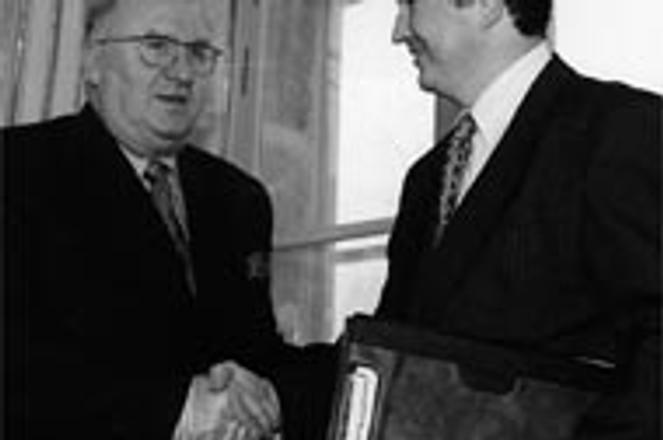President Michal Kováč (left) and KDH MP Ivan Šimko.Peter Brenkus
Six weeks after engineering a nationwide drive to recruit Slovak citizens to sign in favor of directly electing the country's next president, representatives from opposition parties said they have attained enough signatures to force a public vote on the issue.
The petition committee's spokesman, Ivan Šimko, confirmed on February 18 that over 350,000 people had signed sheets supporting a referendum to hold a direct presidential election, marking a "successful completion" to the drive. Šimko, a vice-chairman for the opposition Christian Democratic Movement (KDH), said the committee would now approach coalition deputies about calling a vote to hold the referendum, which would require a three-fifths majority to pass.
"We want to give parliament a chance to adopt the measure and save money," Šimko said. "If it's not accepted or [Speaker of Parliament Ivan] Gašparovič decides not to hold a vote, then we will take it to the president [Michal Kováč]. Once we give it to the president, it cannot be stopped." Šimko announced on February 23 that the petition committee will give parliament until March 3 to take up the issue.
Leaders from all opposition parties in parliament except for the Party of the Democratic Left (SDĽ) launched the petition drive on January 9, saying they believed it was the best way to avert a crisis when President Kováč's term ends in spring 1998. The hostility between coalition deputies, who hold 82 seats in parliament, and opposition MPs is too intense for them to come up with the 90 votes necessary to appoint a candidate for the nation's highest post.
Prime Minister Vladimír Mečiar, speaking at a rally with supporters of the Movement for a Democratic Slovakia (HZDS) on January 8, said his party may support a public vote if it is "an improvement to the constitutional system" and not a "move to protect the interests of one person or a group of losing political parties." His spokeswoman, Magda Pospišilová, changed that tune after the opposition's announcement that it had collected the requisite number of signatures. "The prime minister does not think that [the issue of a direct presidential election] should be decided [by a referendum] because it is against the constitution."
Šimko would not specify how much time the committee will give the coalition to decide whether to deal with the matter in parliament, but he said it would not be long. "We don't want to play with time," he said. "We're not prepared to play this way."
Asked whether this referendum could be linked with one Kováč must call on Slovakia's entrance into NATO (see story, page 3), Šimko said, "I think it would be practical [to have both issues addressed at the same time] to save money. It's the only argument for it, but a very important one."


